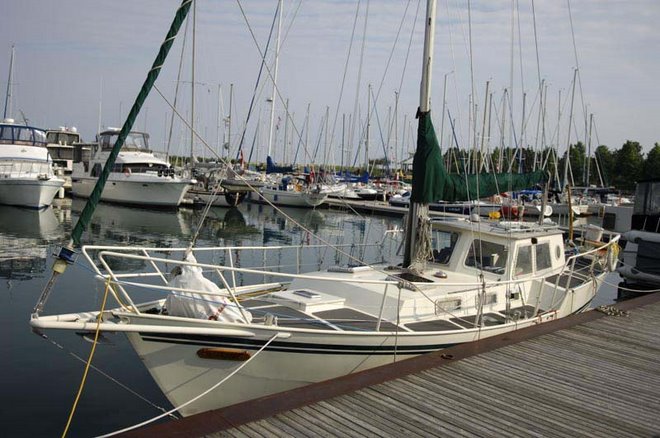 | |
| Eight-day windup. I don't expect it to be exact, but I have little faith in the reliability of cheap battery clocks. |
 |
| Yeah, this is garbage. Sorry, "giftware". |
 |
| The keener-eyed will note that apart from the greater number of numerals, this is the same model as I've just bought. |
 |
| Unfortunately, the 24-hour one on the right took a short tumble and died. Another battery-driven casualty of life aboard. |
Why did I want such a near-antique as a mechanical, hard-to-read wall (or bulkhead) clock? Well, one of the upcoming boat projects will be the installation of our ICOM M-802 SSB transceiver and its associated bits. I noticed way back on my Atlantic delivery in 2009 that skipper Bruce Clark kept a nice small mechanical 24-hour clock screwed above his nav table from which he would conduct his comms, download GRIB weather files and have his daily exchange with the alas-retired weather routing expert Herb Hilgenberg.
 |
| Herb was routing us through this: the remnants of Hurricane Ida. Was a bit bouncy. |
There's two concepts at work on a ship (and of which I have written before): local or ship's time, and the time back in Greenwich. Ship's time is useful for planning lunch, but the time in Greenwich, thanks to centuries of maritime convention, is essential to working out one's position at sea with a sextant. Which I own and know how to use and which doesn't require electricity or a network of satellites. Handy, that, particularly as we live in what are arguably interesting times. Seamanlike prudence starts with a Plan B, and besides, for logical reasons, most radio communications are scheduled in Zulu time and so are many official logbook entries. Keeping one clock aboard coordinated with an arbitrary point on the planet is therefore neither pedantic nor unhinged. And the skipper likes 'em.And has an excellent wrist chronometer as backup.




No comments:
Post a Comment